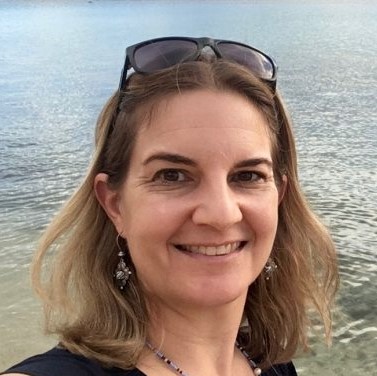From the President: Let's Flip the Switch
by Deborah J. Short
 At this time of year, people in the United States and Canada celebrate Thanksgiving. Originally, conceived as an event to give thanks for the harvest and that consequently brought diverse peoples together in the 17th century, the practice of expressing gratitude for food, family, and friends has endured. A similar Thanksgiving holiday is celebrated in other countries too, such as Brazil, Liberia, and Japan. It seems fitting at this time to take a moment out of our hectic and undoubtedly stressful lives to reflect on the meaning of the holiday.
At this time of year, people in the United States and Canada celebrate Thanksgiving. Originally, conceived as an event to give thanks for the harvest and that consequently brought diverse peoples together in the 17th century, the practice of expressing gratitude for food, family, and friends has endured. A similar Thanksgiving holiday is celebrated in other countries too, such as Brazil, Liberia, and Japan. It seems fitting at this time to take a moment out of our hectic and undoubtedly stressful lives to reflect on the meaning of the holiday.
It’s easy to complain about the deleterious impact that COVID-19 has placed on our personal and professional lives. It has been huge. It has been horrible. But during this season, let’s flip the switch and consider whether there is any silver lining. Has anything positive happened? Is there anything that we can be thankful for?
Three of the directors on TESOL’s board will finish their term in March 2021. They have served our association well for 3 years and have helped steer us through the current difficulties. I asked them to share their reflections: Has there been any benefit from COVID-19 for the field of English language teaching? If you were sitting at your dining room table sharing a Thanksgiving dinner with family and friends, what would you say that you are grateful for?
Maybe you miss traveling during your vacations, visiting family members who live far away, networking with and learning from colleagues at face-to-face events. Were you disappointed that our face-to-face Convention was cancelled in March? Many of us were, including Joe McVeigh, Board Liaison to the Membership Professional Council. But when asked the question, he replied,
I'm thankful that although we are unable to travel, we have actually the opportunity for increased connection with colleagues in other parts of the world through virtual conferences, webinars, and online meetings.
 So, think back over the past few months—have you taken advantage of more opportunities? Have you attended more webinars or conferences because they are virtual? I have. I have deliberately joined sessions outside my usual focus on PK–12 education. It’s been rewarding to learn about second language academic writing, remote teaching on the African continent, and content-based English instruction at universities in Colombia, among other diverse topics.
So, think back over the past few months—have you taken advantage of more opportunities? Have you attended more webinars or conferences because they are virtual? I have. I have deliberately joined sessions outside my usual focus on PK–12 education. It’s been rewarding to learn about second language academic writing, remote teaching on the African continent, and content-based English instruction at universities in Colombia, among other diverse topics.
Many of our TESOL members have struggled to teach effectively in the time of corona. We’ve chronicled the struggles, ranging from pivoting to virtual teaching without training for teacher or learner on the platform to teaching half the class in person in one room while the other half sits in a second room watching the lesson in real-time on a screen and the teacher being expected to move back and forth “seamlessly” between the rooms. We have persevered in spite of the challenges and uncertainty, as Christel Broady, Chair of the Finance Committee, acknowledged in her expression of gratitude:
I am grateful for PK–12 teachers who care about their students, no matter what the mode of instruction is, for schools that assist all students in having the resources to participate in education equally, and for educators advocating for their English language learners in PK–12 schools.
Have you found new allies for your English learners? Many TESOL members report this has happened—other educators in the school or program who share ideas with you to ease the isolation or who teach you how to use an app that helps your students practice English. Others have joined forces with fellow advocates to make sure English learners had devices and internet access, food, and socioemotional counseling. We can give thanks, in part, to the crisis for bringing us together to work on common goals of equitable, safe, and productive learning for all students.
And what have you learned about yourself during this public health and economic crisis? Are you more resilient than you thought you’d be? More creative and resourceful? Has the crisis unexpectedly rekindled your passion for our profession? Katherine Lobo, Board Liaison to the Awards Professional Council, reflected on her own journey during this time.
When I think about what I am grateful for as an educator, in spite of the pandemic and this lousy year, I am thankful that despite all that has happened, I am still able to make a difference by empowering my students to be independent and engaged in society.
Making a difference in the lives of learners. Being able to do that, wanting to do that, continuing to do that in the face of adversity. That’s the bottom line. Thank you, Kathy, Christel, and Joe for sharing your thoughts. Thank you, members of our global English language teaching community for your work and dedication to our field. Stay well, and pause for a moment and ask yourself, what are you grateful for?
Please tell us what you are thankful for in the comments section.
Deborah J. Short, PhD, is TESOL International Association president (2020–2021). She directs Academic Language Research & Training, LLC and provides professional development on academic literacy, content-based ESL, and sheltered instruction worldwide. She has led numerous research projects related to English learner education, codeveloped the SIOP Model, and served as series editor for several 6 Principles books.
TESOL Blogs
Interested in writing a blog for TESOL?
Read the submission guidelines and send us your post!
Check out some of the most recent TESOL Blogs:
|
Music and Writing, by Betsy Gilliland

Music can evoke powerful emotions and memories in human beings. We love a particular piece, or we hate it strongly, or it brings us back to a place and time. Music can also put us into a mindset for writing or inspire us to create something new. In this blog post, I propose a few ideas for integrating music into the teaching of second language writing. Read more. |
|
Engaging ELs Who Are Disengaged During Virtual Learning, by Judie Haynes

If you are an educator of English learners (ELs) who is instructing your students virtually, you are probably having difficulty successfully engaging them. This is especially true if you have newcomers in your class. For online learning in virtual classrooms, we need to revisit and modify tried-and-true strategies that we use to educate ELs when we see them in person in a brick-and-mortar building.
One challenge that I’m hearing about is that many classroom teachers are recording their lessons, and students view these lessons when they are able. ELs, especially newcomers, may not be able to understand a lesson taught this way. Beginning ELs need to have live lessons in real time with teachers every day. The also need an occasion to practice oral English language acquisition daily. Planning these lessons might be an overwhelming task for classroom teachers, so collaboration with ESL educators is crucial.
Here are six basic tenets for teaching ELs that translate well to virtual learning. Read more. |
|
4 Easy Improv Warm-ups for Speaking Classes, by A. C. Kemp
 It can be tough to get students excited about learning, and in this time of online classes, with students sitting in front of a screen all day, it’s even tougher. However, a fun warm-up activity can raise energy and interest in preparation for the day’s lesson. It can be tough to get students excited about learning, and in this time of online classes, with students sitting in front of a screen all day, it’s even tougher. However, a fun warm-up activity can raise energy and interest in preparation for the day’s lesson.
This post includes four simple and silly warm-ups from the world of improv comedy that lower student affect and build community and enthusiasm. Each one includes face-to-face rules and online adaptations. And don’t worry—you don’t need to be a comedian yourself—in improv, the students create the fun themselves. Read more. |